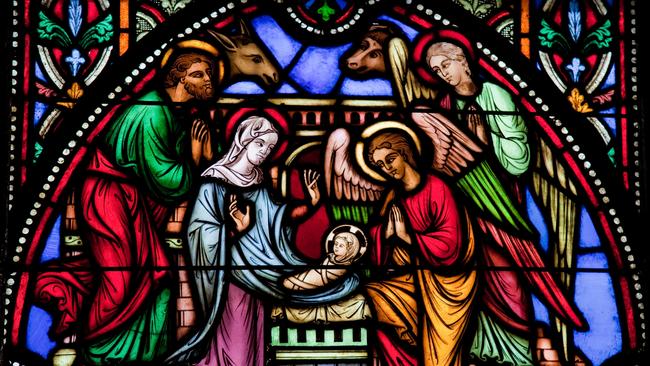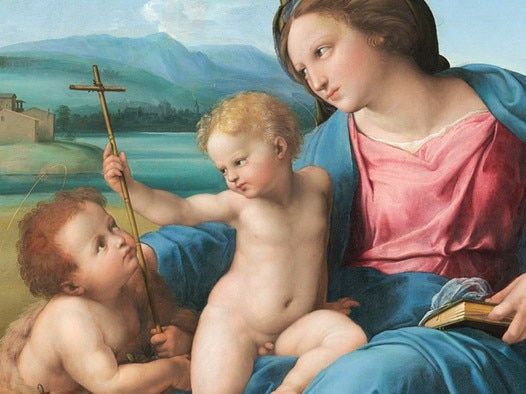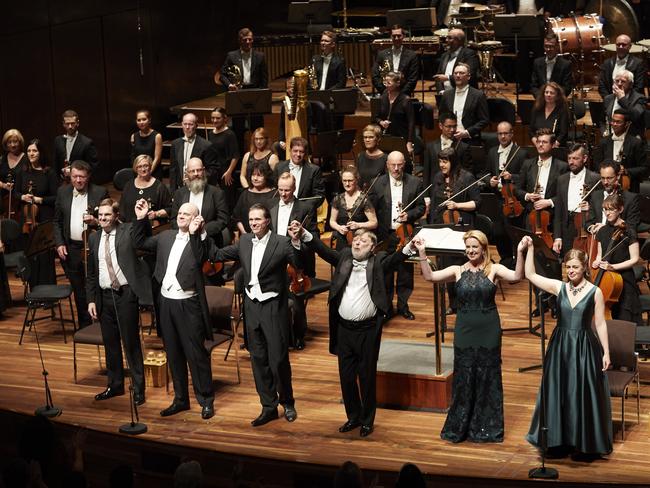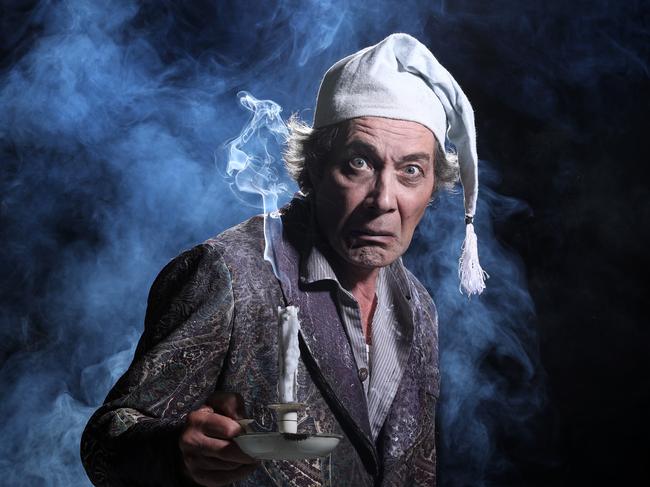Faithful haunted by quest for meaning at Christmas
The Christmas story is a revelation our civilisation discloses to us as a vision of truth whatever faith we can or cannot muster. It outstares the Holocaust and the terrible corruptions of the church.

“How odd of God to choose the Jews.” It’s an old quip and a dodgy one but now as we head towards Christmas it’s a reminder of how steeped in Hebraic culture our civilisation is, despite the terrible things that have gone along with it. It’s also a question that arises with an impassioned poetic pessimism throughout the Hebrew Bible with all that talk of weeping by the rivers of Babylon at the remembrance of Zion. And then there’s that unbelieving question, early on in St John’s Gospel, that comes back at the questioner with all the power and glory in the world: “Can anything good come out of Nazareth?”
As we anticipate Christmas with whatever degree of excitement or dread, it’s worth remembering too the Jewish feast of Hanukkah, which takes its bearings from an incident in the Book of Maccabees — that late Old Testament book technically part of the apocrypha but canonical to Catholic and Orthodox Christians andfull of rebellion and heroism — which involves oil and the lighting of the menorah.
It’s not a major day of remembrance in the Jewish calendar like Yom Kippur or Pesach, the Passover, but it grew in prominence especially in 19th-century America (but also in Western Europe so that the family of the father of Zionism, Theodore Herzl, was keen on it) at about the same time the figure of Saint Nicholas mutated into Santa Claus or Father Christmas with his reindeer and his sleigh and his excuse to lavish gifts on kids.
So stacks of Jewish people took up the habit not only of giving presents to their children but that even tougher Christian habit that some pretty saintly types still practise, of preparing a festive meal for poor people.
It’s not surprising when you think of it because so many Jewish people have always been better at being Christian than a lot of Christians. And no doubt that’s true of the other great religions as well: the Muslims, the Buddhists, the Hindus, who can have such a passionate and effortless belief in their apprehension of the Good. So that they leave us feeling bewildered and inadequate in the face of our materialism and self-centredness. They can have much stronger approaches to spirituality, to meditation, which can be the highest form of prayer. But Christmas, for God’s sake, is no time to be judgmental about religious emphases.
“Judge not lest ye be judged” is a pretty towering injunction from on high. Recently when I heard Brett Sutton, the Chief Health Officer in what just recently was plague-doomed Victoria, describe himself as “a bad Buddhist”, I thought that was probably the best kind.

But it’s fascinating how much of the vision of Christianity we celebrate the beginning of with Christmas is implicit in the Hebrew bible. After all, the most popular work in the classical music repertoire — and one is performed seasonally, viruses apart, at Christmas — is Handel’s Messiah,yet so much of that comes out of the older Jewish version of the vision of truth.
Think of the great setting of Isaiah. “He was despised and rejected … A man of sorrow acquainted with grief.” For what it’s worth, the version of the great oratorio I like best is the old panoramic neo-operatic one, for a huge orchestra and the biggest voices, which was edited by Eugene Goosens (who got into trouble due to Australian prudery during his time in Sydney), which was recorded by Sir Thomas Beecham in the 1950s with the great Canadian singer John Vickers singing the tenor part. Something very like this was the last MessiahI saw performed by the Melbourne Symphony Orchestra under the baton of Sir Andrew Davis.
But think of the depth and poignancy of the words of Isaiah, the sense of excruciation, the poetry of lamentation. Someone said to me recently — and it’s true regardless of what you believe or disbelieve — that the historical figure of Jesus was clearly steeped in the prophet Isaiah and saw his own fated experience as the realisation of that vision. Very traditional Christians would see Isaiah’s voice, delineating himself as a man of sorrows, as being a literal vision of what happens to the Jesus he hails as The Son of Man, The Son of God. Others would see it as a text that burned in the mind of the man Pilate washed his hands of, a prophecy Christ brought to consummation.
It’s part of the genius of Handel who articulates the triumphant side of this vision — the Hallelujah chorus that everyone stands up for, following the royal precedent — as something that grows out of the intimations of pain in the terrible sense of sadness that is given such definitive expressions in Isaiah even though that part of the Hebrew Bible has its extraordinary exaltations as well.
It’s also true that some of the greatest literary splendours of the Gospels come when the language is shadowed with the glory of the old Judaic dispensation. French fascist Charles Maurras loved the musical settings of Mary’s Magnificat but hated the Jewishness of its sense of portent and exultation. The passage from Luke’s Gospel is one of the greatest things inside or outside literature, sacred or profane. The angel Gabriel has come to Mary and told her the power of the Most High will overshadow her and she will bear a son, though, as she says, she has had no knowledge of a man. She acquiesces: “Be it done unto me according to thy word.” And then in the traditional rhetoric of Judaic prophecy this slip of a girl — who will be known to the ages, to quote the words of the Christian litany of Benediction, as “the great Mother of God, Mary Most Holy”, speaks like one possessed by her sense of blessedness.

“My soul doth magnify the Lord, / And my spirit hath rejoiced in God my Saviour. / For he hath regarded the low estate of his handmaiden: for, behold, from henceforth all generations shall call me blessed. / For he that is mighty hath done to me great things; and holy is his name. / And his mercy is on them that fear him from generation to generation. / He hath shewed strength with his arm; he hath scattered the proud in the imagination of their hearts. / He hath put down the mighty from their seats, and exalted them of low degree. / He hath filled the hungry with good things; and the rich he hath sent empty away. / He hath helped his servant Israel, in remembrance of his mercy; / As he spake to our fathers, to Abraham, and to his seed for ever.”
You can almost hear the voice of Judaism turning into a new thing which is compatible and congruent with its oldest traditions. And this is, of course, the spirit of Hanukkah, which offers as it were a gift of emulation to a Christianity it recognises as the legacy of itself. What is the greatest musical version of the Magnificat? Beyond the Gregorian setting or the Anglican plainchant, there is the unsurpassable grandeur of Bach. The words themselves, originally penned or chanted in humble Koine Greek, then translated into Latinby a translator of genius, Saint Jerome, then into the German of Martin Luther and for us into the grand English translations of which the King James is the grandest.
But behind it all there is the Jewish side of the Judeo-Christian vision, which we have no choice but to acknowledge as a birthright. There is plenty of the Greek side of our inheritance in the vision that begins with the Christmas story, there is the Logos, the Word which is the light that shines in the darkness which cannot comprehend it. But there is no mistaking the origins and the set.
You don’t have to like Benjamin Netanyahu to realise he knew what he was doing when he quoted Isaiah at the United Nations: “The people who walked in darkness have seen a great light.”
The greatest visual realisation of the Christmas story with the verse of the child who is the incarnation of goodness and truth is in the paintings of the Renaissance. Think of Leonardo’s The Virgin and The Rocks or those heartbreakingly beautiful Botticelli Madonnas or the most famous of the Raphael Madonnas with child. Somewhere along the line they will lead to Michelangelo’s Pietà, the mourning Madonna caught forever holding the dead body of her son. But then there is the great triptych of Matthias Grünewald — no Christ ever looked so hideously, desecratingly butchered and dead. (The image shook people’s faith.) But then you turn and see his Resurrection. I remember Barry Jones, that most cultivated of politicians, telling me how when he saw this it was like a religious revelation to him.

The Christmas story is a revelation our civilisation, for what it’s worth, discloses to us as a vision of truth whatever faith we can or cannot muster. It outstares the Holocaust, it outstares the terrible corruptions of the church, the ones that have involved the sexual degradation of children and the ones that have not only let the moneylenders into the temple but made the Eternal City itself into a sometime den of thieves, the thing that reduced Jesus to rage.
But there are a thousand aspects to Christmas. There’s Dickens’ A Christmas Carol, which transcends the sentimentality it seems to flaunt and becomes a parable of the inner good within the veneer of crusty unkindness. There’s Bing Crosby singing White Christmas, the 20th-century carol by that Broadway songsmith and child of Abraham, Irving Berlin.
And then there are the carols as old as our memories reach: Silent Night, O Come All Ye Faithful, Away in a Manger, all those tidings of comfort and joy we want to ascend to.
James Joyce, the greatest writer of fiction and the poetic language that can shape life and render it sad and funny, makes the hero of his epic, Ulysses, his latter-dayOdysseus, his wanderer, that poignant and loveable Jew, Leopold Bloom, who was played on stage by the great Zero Mostel, the man who first did Fiddler on the Roofon Broadway.
At one point Bloom confronts a bigoted nationalistic Irish Citizen who screams at him and Bloom comes back at his abuser and tells him Christ was a Jew, “Your God was a Jew like me”. Bloom also offers his own shorthand for the vision that makes Christmas haunt us all. “Love,” he says, “I mean the opposite of hatred.”
